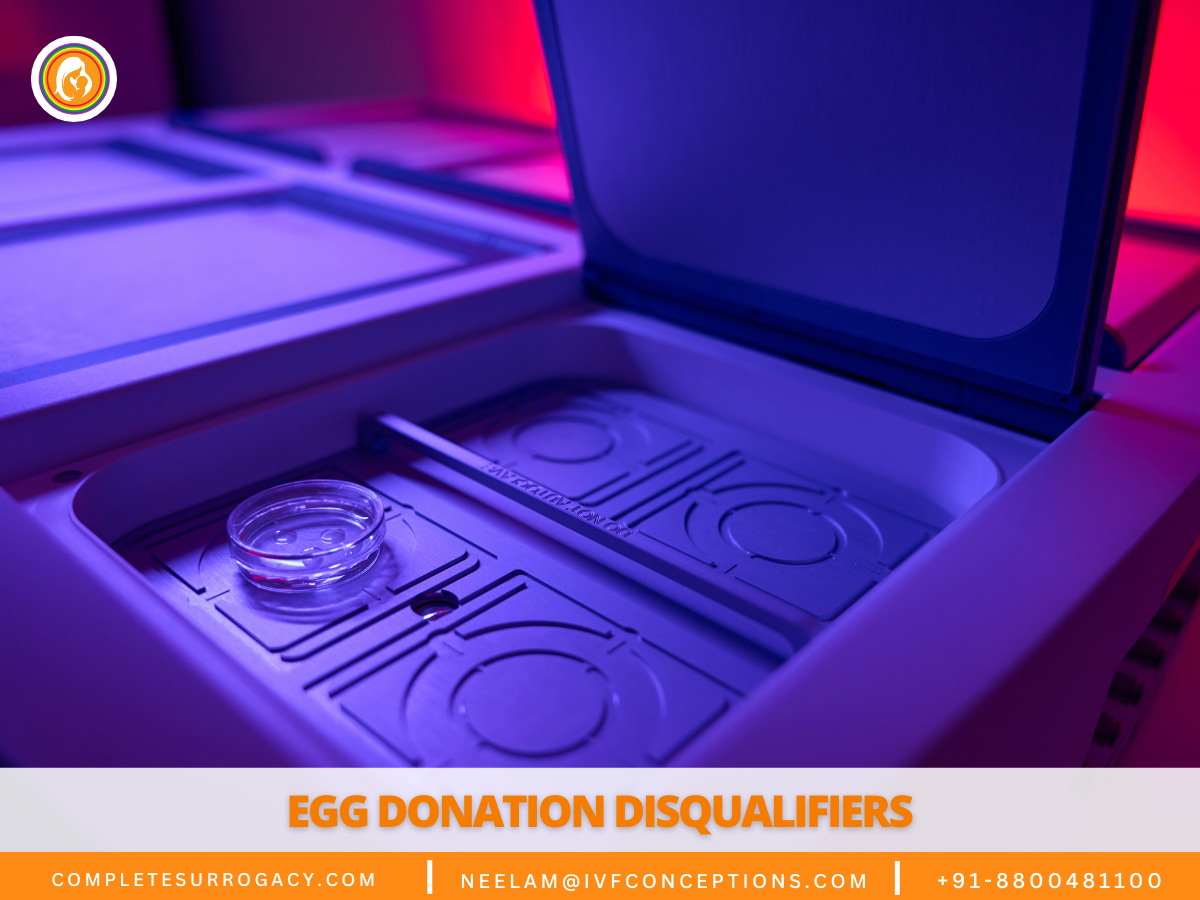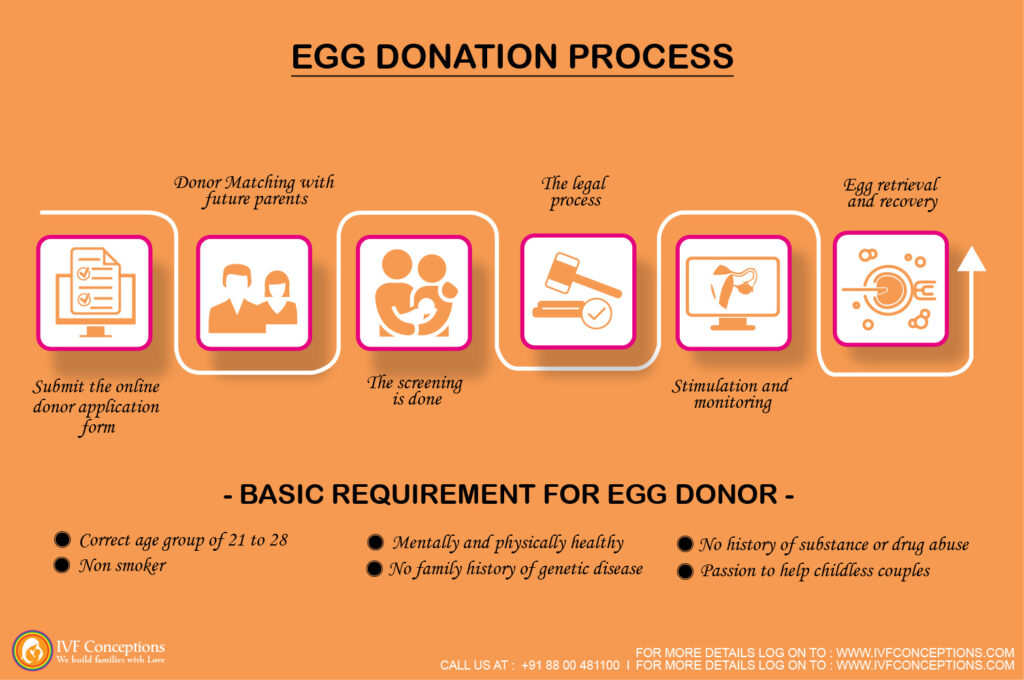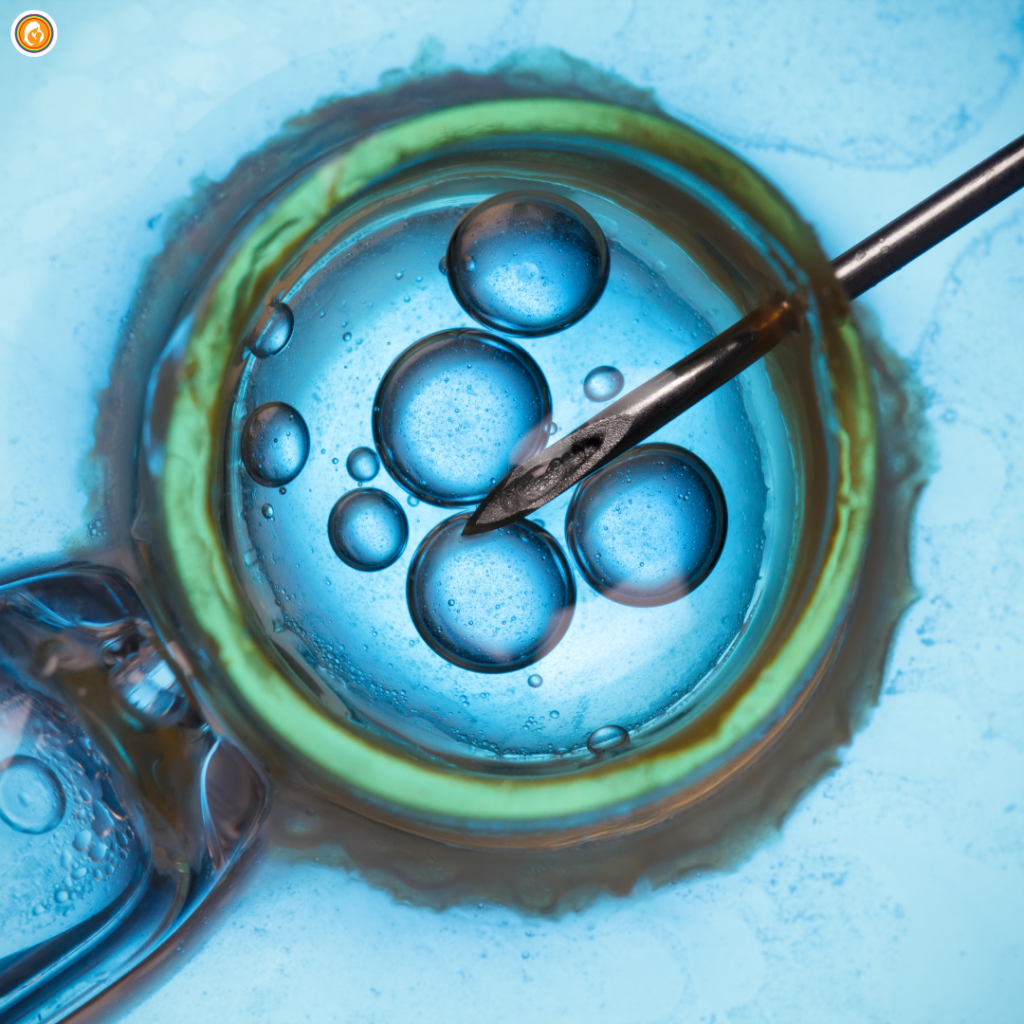Egg Donation Disqualifiers: What You Need to Know

Thinking about egg donation? You might wonder what can stop you from being a donor. Factors like age, health, lifestyle, and mental health can disqualify you. Knowing these reasons is key for those thinking about egg donation. Let’s explore in detail about Egg Donation Disqualifiers that you should know.
The rules for egg donation are in place to keep everyone safe. Programs like UCSF, which started in 1991, make sure the process is safe and successful. By understanding what can disqualify you, you can decide if you’re eligible and what risks you might face.
Get in touch for a Free Surrogacy Consultancy:
📲 91-8800481100 ( WhatsApp, Line, Viber)
Egg Donation Disqualifiers – Summary Table
| Category | Disqualifying Factors |
| Age Restrictions | Under 21 or over 35 years (varies by clinic) |
| Ovarian Reserve | Low AMH levels, high FSH levels, or poor egg quality |
| Menstrual Irregularities | Irregular periods indicating hormonal imbalance |
| Chronic Health Issues | Diabetes, thyroid disorders, epilepsy, PCOS, etc. |
| Genetic Disorders | Family history of inherited diseases (e.g., cystic fibrosis, sickle cell anemia) |
| Reproductive Conditions | Endometriosis, ovarian cysts, or uterine fibroids |
| Infectious Diseases | Positive for HIV, Hepatitis B & C, STDs, or other infections |
| Cancer History | Personal or family history of certain cancers |
| Miscarriage History | Recurrent pregnancy loss or fertility issues |
| Smoking, Drugs, Alcohol | Active use of tobacco, recreational drugs, or excessive alcohol |
| BMI Concerns | Extremely underweight or overweight (outside clinic’s acceptable BMI range) |
| Unhealthy Lifestyle | Poor diet, lack of nutrition, or excessive stress |
| Lack of Commitment | Unwilling to attend medical checkups or follow protocols |
| Mental Health Conditions | Severe depression, anxiety, bipolar disorder, schizophrenia |
| Medication Use | Taking antidepressants or psychotropic medications |
| Emotional Instability | Difficulty handling the psychological aspects of donation |
| Legal Age Requirement | Below 21 or not meeting country’s legal age criteria |
| Consent Issues | Unable to provide informed consent for egg retrieval |
| Past Donation Limits | Surpassed the maximum allowable egg donation cycles (usually 6) |
| Criminal Background | Failed background checks or legal issues |
Additional guide for intended parents:
How Much Does Surrogacy Cost in Argentina
Key Takeaways
- Egg donation disqualifiers can include age, medical conditions, lifestyle factors, and psychological screening.
- Egg donation eligibility requirements and egg donor screening criteria are in place to ensure safety and well-being.
- Understanding egg donor disqualifications is crucial for determining eligibility and navigating the process.
- Reputable programs like UCSF provide thorough screening and support to promote successful outcomes.
- Egg donors must meet specific requirements, including age, BMI, and education level, to be eligible for the program.
- The egg donation process involves multiple medical appointments, fertility medication stimulation, and monitoring to ensure the donor’s health and safety.
- Donors are compensated for their time and effort, with ovum donors receiving $14,000 upon completing an egg donation cycle.
Understanding Basic Egg Donation Requirements
To become an egg donor, you need to meet some basic requirements. These include your age, physical health, and other criteria. You must be between 18 and 31 years old to donate eggs.
Being in good physical health is also key. Donors should have a Body Mass Index (BMI) between 19 and 29. Women who are still breastfeeding can’t donate eggs until they’ve stopped nursing. A detailed medical and psychological screening is also part of the process.

Several factors influence egg donor requirements:
- Age: between 18 and 31 years old
- BMI: between 19 and 29
- Medical history: no history of certain medical conditions
- Psychological screening: a thorough evaluation to assess mental health
Knowing these requirements is crucial for a successful egg donation process. By meeting these criteria, you can make the donation experience positive for everyone involved.
Egg Donor Qualification Requirement
To become an eligible egg donor, a woman must meet specific medical, lifestyle, psychological, and legal criteria. Below is a detailed list of the necessary qualifications:
1. Medical Qualifications
✅ Age Range: Typically 21 to 30 years (some clinics allow up to 35).
✅ Good Ovarian Reserve: Normal AMH (Anti-Müllerian Hormone) and FSH levels.
✅ Regular Menstrual Cycles: Indicating healthy reproductive function.
✅ No Genetic Disorders: No family history of inherited diseases like cystic fibrosis or sickle cell anemia.
✅ Good Physical Health: No chronic conditions (e.g., diabetes, thyroid disorders, epilepsy).
✅ No Reproductive Health Issues: Free from endometriosis, fibroids, ovarian cysts.
✅ Negative for Infectious Diseases: Must test negative for HIV, Hepatitis B & C, STDs.
✅ Healthy BMI: Must have a Body Mass Index (BMI) within a healthy range.
✅ Non-Smoker, No Drug Use: Must not smoke, use drugs, or consume excessive alcohol.
2. Lifestyle & Behavioral Qualifications
✅ Commitment to the Process: Willing to follow clinic protocols and medical procedures.
✅ Healthy Lifestyle: Follows a nutritious diet, exercises regularly, and maintains overall well-being.
✅ No Recent Use of Birth Control Implants or Depo-Provera: These can affect ovarian function.
3. Psychological & Emotional Qualifications
✅ Mentally Stable: No history of severe anxiety, depression, bipolar disorder, or schizophrenia.
✅ Emotionally Mature: Able to handle the psychological aspects of egg donation.
✅ No Use of Antidepressants or Psychiatric Medications: Must be off medication for a specified period.
✅ Strong Support System: Should have family or friends for emotional support.
4. Legal & Ethical Qualifications
✅ Legal Age & Consent: Must be at least 21 years old and able to provide informed consent.
✅ Clean Background Check: No history of criminal activity.
✅ No Past Egg Donation Limit Exceeded: Most clinics allow a maximum of 6 egg donation cycles.
✅ Willing to Undergo Genetic and Medical Screening: Must agree to thorough testing and evaluations.
Medical Conditions That Prevent Egg Donation
When you think about egg donation., knowing what medical conditions stop you is key. Certain health issues can make you not eligible to donate eggs. These include genetic disorders, reproductive health problems, and chronic conditions.
Having a family history of genetic disorders like cystic fibrosis or sickle cell anemia might stop you from donating. Issues like endometriosis or PCOS can also be a barrier. And chronic conditions, like diabetes or high blood pressure, might need extra attention and could stop you from donating.
- Genetic Disorders and Hereditary Conditions
Genetic disorders can be passed down to future generations. So, it’s important to look at your family’s medical history. If you have a family history of genetic disorders, you might not be able to donate eggs. Talking to your doctor about your family’s health is crucial.
- Reproductive Health Issues
Problems like endometriosis or PCOS can affect your ability to donate eggs. These issues can impact your reproductive health and might make you not eligible. It’s important to talk to your doctor about your reproductive health.
- Chronic Medical Conditions
Chronic conditions, such as diabetes or high blood pressure, might need extra care and could stop you from donating eggs. It’s important to discuss your medical history with your doctor. Knowing about egg donation medical disqualifications helps you decide if you can donate eggs.
Common Egg Donation Disqualifiers in Screening Processes

Egg Donation Disqualifiers
Women who do not meet the necessary medical, lifestyle, or legal criteria are disqualified from becoming egg donors. Below are the key disqualifying factors:
1. Medical Disqualifiers
❌ Age Restrictions – Typically under 21 years or over 35 years (varies by clinic).
❌ Low Ovarian Reserve – Poor AMH (Anti-Müllerian Hormone) levels or high FSH levels.
❌ Irregular Menstrual Cycles – Indicative of hormonal imbalances.
❌ Chronic Health Conditions – Includes diabetes, thyroid disorders, epilepsy, PCOS, etc.
❌ Genetic Disorders – Family history of inherited diseases like cystic fibrosis or sickle cell anemia.
❌ Reproductive Health Issues – Endometriosis, uterine fibroids, or ovarian cysts.
❌ Infectious Diseases – Positive for HIV, Hepatitis B & C, STDs, or other transmittable infections.
❌ History of Cancer – Personal or family history of certain cancers.
❌ History of Miscarriages – Repeated pregnancy loss or fertility issues.
2. Lifestyle & Behavioral Disqualifiers
❌ Smoking, Drug, or Alcohol Use – Active use of tobacco, recreational drugs, or excessive alcohol.
❌ Poor BMI – Extremely underweight or overweight (BMI outside the clinic’s acceptable range).
❌ Poor Diet & Unhealthy Lifestyle – Lack of proper nutrition or excessive stress.
❌ Lack of Commitment – Unwilling to attend medical checkups and follow protocols.
3. Psychological & Mental Health Disqualifiers
❌ History of Mental Illness – Severe anxiety, depression, bipolar disorder, or schizophrenia.
❌ Use of Antidepressants or Psychotropic Medications – Recent or ongoing treatment.
❌ Emotional Instability – Difficulty handling the emotional aspects of egg donation.
4. Legal & Ethical Disqualifiers
❌ Age Below Legal Requirement – Under 21 years old (or the minimum legal age in some countries).
❌ Lack of Consent – Unable to provide informed consent for egg retrieval.
❌ Previous Egg Donation Limits Reached – Many clinics limit 6 donations per donor.
❌ Criminal Background – Failed background checks or involvement in illegal activities.
The egg donation screening process checks a donor’s health, lifestyle, and mental health. Several factors can make someone not eligible, like lifestyle choices and mental health tests. It’s important to be truthful and open during this time to be considered for egg donation.
Some reasons why someone might not qualify include a family history of health issues, a BMI over 28, and using alcohol or drugs. Also, getting a blood transfusion, body piercing, or permanent tattoo in the last year can be a reason to disqualify someone.
- Age: Donors must be between 21 and 29 years old to maximize success rates.
- BMI: A BMI over 28 is a disqualifier, emphasizing the importance of maintaining a healthy weight.
- Lifestyle factors: Smoking, substance abuse, and certain contraceptive methods can disqualify potential donors.
It’s key to know about the egg donation screening process and egg donor screening criteria if you’re thinking about donating. Knowing these details helps you understand if you’re eligible. The egg donation disqualification reasons can change, but being honest is always important.
Lifestyle Factors That May Disqualify Potential Donors

When you think about egg donation, it’s key to know that some lifestyle choices can affect your eligibility. Certain habits, like smoking or using recreational drugs, can harm egg quality and lower fertility success rates. Also, having a body mass index (BMI) outside the healthy range of 18-29 might lead to restrictions.
Travel and exposure to certain environments are also important. For instance, recent trips to places with high infectious disease risks could make you ineligible. It’s vital to be mindful of these factors and how they might affect your eligibility. Some key things to consider include:
- Substance use and history, including smoking and recreational drug use
- Body Mass Index (BMI) requirements, with a healthy range of 18-29
- Travel and environmental exposure concerns, such as recent travel to high-risk areas
By understanding these lifestyle disqualifications and restrictions, you can make a well-informed decision about your eligibility. This knowledge helps you prepare for the egg donation process.
| Lifestyle Factor | Impact on Eligibility |
| Substance use | Can disqualify due to impact on egg quality and fertility success rates |
| Body Mass Index (BMI) | Must be within healthy range of 18-29 to be eligible |
| Travel and environmental exposure | Recent travel to high-risk areas may disqualify due to infection risk |
Psychological and Emotional Screening Barriers
When you think about egg donation, it’s key to know about egg donation psychological screening and egg donor emotional screening. These tests check your mental health and emotional state. They make sure you’re ready for the donation journey.
The egg donation mental health requirements are there to protect you and the person receiving the eggs. A detailed psychological check can find mental health problems like depression or anxiety. These could affect if you can donate.
Some important parts of the screening include:
- Checking if you’re emotionally stable and can handle the donation process
- Looking at your mental health history and any treatments you’ve had
- Talking about why you want to donate and what you expect
Being open and honest during the screening helps make the donation process go well. Remember, the aim of egg donation psychological screening is to help your well-being and the recipient’s.
| Screening Component | Purpose |
| Psychological Evaluation | Assess mental health and emotional stability |
| Emotional Screening | Evaluate ability to cope with donation process |
| Mental Health History | Review previous treatments and mental health issues |
The Impact of Family Medical History on Eligibility
Your family medical history is key when you think about egg donation. It helps find genetic risks that could be passed on. You’ll need to share a detailed family medical history, covering both your close and distant relatives.
This info helps check for hereditary diseases and genetic disorders. Genetic testing is also a big part of the screening. It looks for genetic risks. Plus, there’s a test for hereditary diseases to ensure the health of the future child.
- Genetic Testing Requirements
Genetic testing is crucial in egg donation. It shows if you carry genetic mutations that could lead to inherited diseases. The American Society for Reproductive Medicine (ASRM) says all egg donors should get tested for this reason.
- Hereditary Disease Screening
Hereditary disease screening is also vital. It spots inherited conditions that could harm the child’s health. This screening includes looking at your family’s medical history and genetic tests for risks.
- Family Health Documentation
You’ll need to give detailed family health records. These should cover your immediate and extended family, including their health, age, and cause of death if known. Here’s what you might need to provide:
| Family Member | Information Required |
| Immediate Family Members | Medical history, age, and cause of death (if applicable) |
| Extended Family Members | Medical history, age, and cause of death (if applicable) |
| Children (if applicable) | Medical information, including any genetic disorders or hereditary diseases |
By sharing your family’s health records and getting genetic and disease screenings, you help ensure the child’s health. This info also helps decide if you’re eligible to be an egg donor.
Additional guide for intended parents:
How Much Does Surrogacy Cost in India
How Much Does Surrogacy Cost In Kazakhstan
Conclusion: Making an Informed Decision About Egg Donation
Choosing to be an egg donor or to use donor eggs for fertility needs is a big decision. It’s important to think about your age, health history, and lifestyle. Knowing these details helps decide if egg donation is right for you.
The egg donation journey can be both emotionally and financially tough. Costs can be between $20,000 to $40,000. It’s key to understand your state’s laws and insurance for these costs. Also, think about the emotional side, as it can affect both the donor and the recipient.
Deciding on egg donation means looking at the eligibility and requirements carefully. It’s about weighing the personal, financial, and emotional sides. Talking to a trusted fertility clinic can help you make the best choice for you or your family.
We are happy to assist you with one of our global surrogacy programs best suited you your personal, financial,, and legal needs. I am here to assist you every step of the way.
Get in touch for a Free Surrogacy Consultancy:
📲 91-8800481100 ( WhatsApp, Line, Viber)
FAQs for Egg Donation Disqualifiers
What are the basic requirements for becoming an egg donor?
To become an egg donor, you need to be between 19 and 29 years old. Some clinics might accept donors up to 34. You also need to be in good physical health. Plus, your BMI must be between 18 and 29.
What medical conditions can prevent someone from donating eggs?
Certain medical conditions can stop you from donating eggs. These include genetic disorders that could be passed on. Also, reproductive health issues like endometriosis or PCOS are a no-go. Chronic conditions such as diabetes or hypertension also disqualify you.
What lifestyle factors may disqualify a potential egg donor?
Lifestyle choices can also affect your eligibility. Using substances like smoking or drugs is a big no. Being overweight or underweight can also be a problem. Traveling to areas with high disease risks is another factor to consider.
How does the psychological screening process work for egg donation?
Every potential egg donor must go through a detailed psychological check. This is to make sure they’re mentally healthy and emotionally stable. If any issues like depression or anxiety are found, you might not be able to donate.
How does family medical history impact eligibility for egg donation?
Your family’s medical history is very important. It includes genetic tests for disorders and diseases. Having a detailed family health record helps ensure the donation is safe. It helps identify any potential risks.
References used
https://www.sart.org
https://www.hfea.gov.uk

Author Bio: Neelam Chhagani is an International Surrogacy Expert with 15 years of experience in the fertility and surrogacy domain. As the founder of IVF Conceptions and Complete Surrogacy, she has guided over 4,000 intended parents worldwide on their surrogacy journey to parenthood. Recognized as a trusted authority, she specializes in holistic infertility solutions and third-party reproduction consulting.
Holding an MA in Counselling Psychology and a PGD in Mental Health, Neelam is a proud member of the European Fertility Society (EFS) and the European Society of Human Reproduction and Embryology (ESHRE). She is also a leading surrogacy blogger, providing valuable insights into ethical and practical surrogacy solutions.
Since 2010, committed to supporting ALL family types, Neelam has been passionate about helping intended parents grow their families with compassion, integrity, and a focus on secure and affordable surrogacy options Globally.
Learn more about Neelam:
https://www.ivfconceptions.com/neelam-chhagani-surrogacy-consultant/
https://www.linkedin.com/in/neelam-chhagani-92892229/















I was introduced to Neelam by a friend who worked with Neelam for surrogacy. Neelam is absolutely wonderful. I am a single male and the journey to fatherhood is not that easy. Neelam connected me to a program ideal for my circumstances. She was with me throughout the pregnancy providing advice and guidance along the way. I am so grateful I found her and am thrilled today that I have a beautiful daughter. I highly recommend Neelam to anyone who is on a journey to become a parent. Having a child has changed my world for the better. I wish others success with their own journey and recommend you connect with Neelam to find a path that is best for you.
SA (USA)